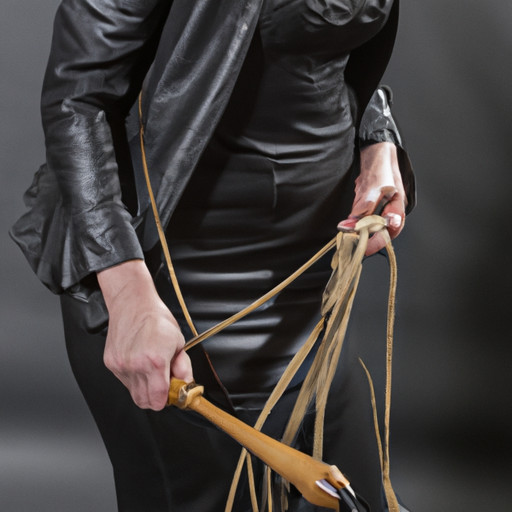Can Femdom Therapy be beneficial for individuals who are not actively involved in BDSM or dominant/submissive relationships?
In recent years, alternative forms of therapy have gained popularity and recognition for their potential to address various psychological and emotional issues. One such therapy that has been garnering attention is Femdom Therapy. While traditionally associated with the BDSM (Bondage, Discipline, Sadism, Masochism) community, Femdom Therapy has begun to be explored as a therapeutic tool even for individuals who are not actively involved in BDSM or dominant/submissive relationships. In this blog post, we will delve into the concept of Femdom Therapy and explore its potential benefits for individuals outside the BDSM community.

Firstly, it is important to understand what Femdom Therapy entails. Femdom, short for Female Domination, refers to a power dynamic in which the dominant partner, typically a woman, takes control over the submissive partner. In Femdom Therapy, the power dynamic is utilized as a means of therapy, with the dominant partner guiding the submissive partner through various exercises and activities to address psychological and emotional concerns.
One of the key reasons why Femdom Therapy can be beneficial for individuals not involved in BDSM is its focus on power exchange and relinquishing control. In our everyday lives, we often find ourselves overwhelmed by responsibilities and expectations. Femdom Therapy provides a safe space for individuals to temporarily surrender control, allowing them to experience a sense of liberation and relief. This power exchange can help individuals develop a greater awareness of their own needs and desires, leading to improved self-esteem and self-empowerment.
Furthermore, Femdom Therapy can also be seen as a form of role-playing, allowing individuals to explore different aspects of their personality and emotions. By assuming the submissive role, individuals can tap into their vulnerability and engage in cathartic experiences. This can be particularly beneficial for those who struggle with expressing emotions or have difficulty connecting with their own desires. Through the guidance of a skilled Femdom therapist, individuals can explore and process their emotions in a safe and non-judgmental environment.
Additionally, Femdom Therapy can also address issues related to boundaries and consent. In a Femdom session, clear boundaries and consent are essential, ensuring that both the dominant and submissive partners feel safe and respected. Learning to communicate and negotiate boundaries in a therapeutic context can be immensely valuable for individuals who struggle with asserting their own boundaries in personal and professional relationships. By experiencing healthy power dynamics within a controlled environment, individuals can gain a greater understanding of consent and develop the skills to establish and maintain healthy boundaries in their everyday lives.
It is important to note that Femdom Therapy should only be practiced under the guidance of a trained and experienced therapist who understands the nuances of BDSM dynamics and can create a safe and consensual environment. Additionally, individuals considering Femdom Therapy should engage in open and honest communication with their therapist to ensure their needs and boundaries are respected.
In conclusion, Femdom Therapy, although traditionally associated with the BDSM community, can offer potential benefits for individuals who are not actively involved in dominant/submissive relationships. By exploring power dynamics, relinquishing control, and engaging in role-play, individuals can tap into their emotions, develop self-awareness, and gain valuable skills in boundary-setting and consent. However, it is crucial to approach Femdom Therapy with caution and under the guidance of a qualified therapist. Published here.
What are some common misconceptions or stereotypes about the domme cam industry?
In today’s digital age, the internet has opened up a world of possibilities, including the rise of the adult entertainment industry. One particular sector that has gained significant attention is the domme cam industry. However, with its growing popularity, there are often misconceptions and stereotypes associated with this industry. In this blog post, we will delve into some of the common misconceptions and stereotypes surrounding the domme cam industry and shed light on the reality behind them.

Misconception 1: Domme Cam performers are solely motivated by money
One of the most prevalent misconceptions about Domme Cam performers is that they are solely motivated by financial gain. While it is true that financial compensation is a part of their work, it is important to acknowledge that many performers in the industry genuinely enjoy what they do. For some, it is a way to explore their own sexuality or embrace their dominant side. It is crucial to recognize that these performers have agency and actively choose to engage in this line of work.
Misconception 2: Domme Cam performers are exploited or coerced
Another misconception is that Domme Cam performers are victims of exploitation or coercion. This assumption stems from the misconception that anyone involved in the adult entertainment industry is forced into their work. However, it is essential to understand that the Domme Cam industry, like any other industry, has its fair share of individuals who may have entered the profession voluntarily. It is crucial to refrain from generalizations and assumptions about the experiences of these performers.
Misconception 3: Domme Cam performers lack agency and autonomy
There is a common stereotype that Domme Cam performers lack agency and autonomy, and that they are controlled by their clients or the industry as a whole. This misconception fails to recognize the power dynamics at play in these relationships. Domme Cam performers have the ability to set their own boundaries, negotiate their rates, and choose their clients. They have the final say in what they are comfortable with and can refuse any request that goes beyond their personal boundaries.
Misconception 4: Domme Cam performers are not respected or valued
It is often assumed that Domme Cam performers are not respected or valued in society due to the nature of their work. This misconception ignores the fact that sex work is work, and individuals who engage in it deserve the same respect and dignity as those in any other profession. It is essential to challenge societal stigmas and recognize that the value of a person should not be determined by their chosen profession.
Misconception 5: Domme Cam performers are not empowered
Contrary to popular belief, Domme Cam performers can find empowerment and autonomy in their work. For many, being able to explore their sexuality, express their dominant side, and connect with clients on a personal and emotional level can be empowering. It is crucial to acknowledge that empowerment can take different forms for different individuals and that it is not for others to define what is empowering for someone else.
In conclusion, the Domme Cam industry is often surrounded by misconceptions and stereotypes. It is important to challenge and debunk these misconceptions to foster a more inclusive and understanding society. By recognizing the agency, autonomy, and empowerment that Domme Cam performers possess, we can promote a more respectful and accepting attitude towards those working in the adult entertainment industry. Let us strive to break the stigma and promote an environment that values the choices and experiences of all individuals, regardless of their profession.
Post Comment